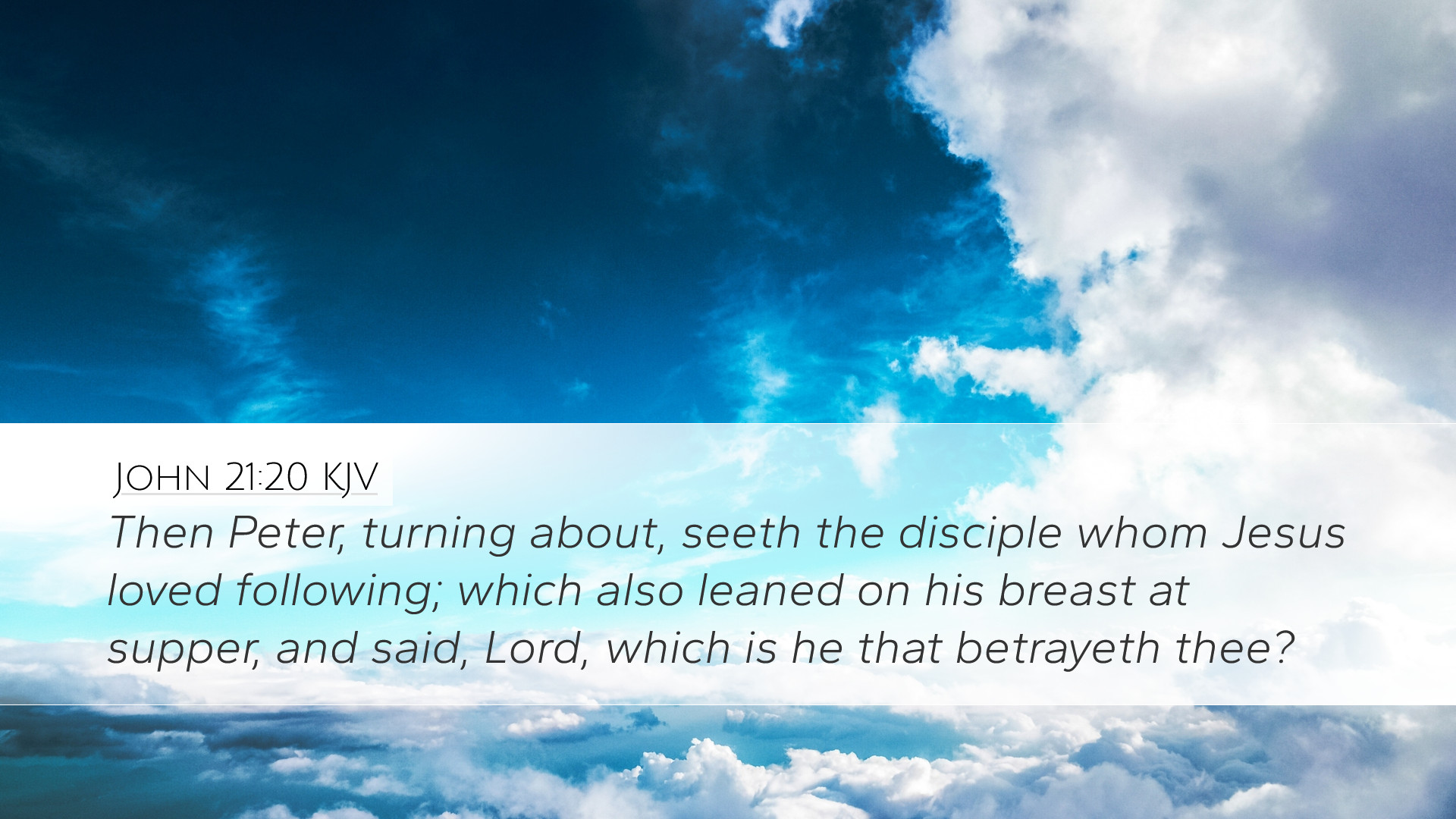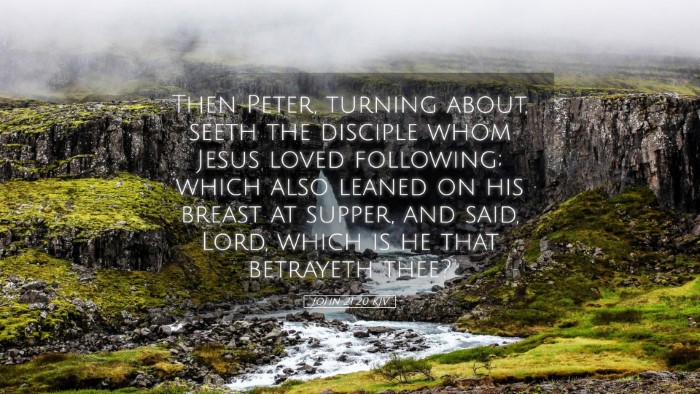Old Testament
Genesis Exodus Leviticus Numbers Deuteronomy Joshua Judges Ruth 1 Samuel 2 Samuel 1 Kings 2 Kings 1 Chronicles 2 Chronicles Ezra Nehemiah Esther Job Psalms Proverbs Ecclesiastes Song of Solomon Isaiah Jeremiah Lamentations Ezekiel Daniel Hosea Joel Amos Obadiah Jonah Micah Nahum Habakkuk Zephaniah Haggai Zechariah MalachiJohn 21:20
John 21:20 KJV
Then Peter, turning about, seeth the disciple whom Jesus loved following; which also leaned on his breast at supper, and said, Lord, which is he that betrayeth thee?
John 21:20 Bible Commentary
Commentary on John 21:20
In John 21:20, we find an insightful verse that captures a significant moment of interaction between Jesus and Peter. The verse states:
"Then Peter, turning around, saw the disciple whom Jesus loved following, who also had leaned on His breast at the supper, and said, 'Lord, who is the one who betrays You?'" (John 21:20, NKJV)
Overview
This verse is pivotal as it reflects the dynamics of discipleship and the relationships among the apostles. John, often identified as "the disciple whom Jesus loved," holds a unique place in the storyline of the Gospels. The act of leaning on Jesus' bosom at the Last Supper signifies intimacy and closeness, which is echoed throughout the accounts of their time together. This commentary synthesizes thoughts from various public domain commentaries, including Matthew Henry, Albert Barnes, and Adam Clarke, to provide a multifaceted analysis of the significance of this verse.
Insights from Matthew Henry
Matthew Henry emphasizes the relational aspect depicted in this verse. He notes the importance of the beloved disciple's presence in the narrative:
- Fellowship among the Disciples: Henry highlights that Peter's turning to inquire about John symbolizes a common instinct of disciples to compare and reflect on their fellow believers. This moment serves to remind believers of the unique paths each disciple walks while still being part of the same community.
- Jesus' Recognition of Individuals: The way Peter identifies John shows a deeper understanding of how Christ knows His followers individually. This serves as an assurance that every believer is known and loved by Christ.
- Lessons in Inquiry: Henry points out that Peter’s question about the betrayer reflects the human desire to understand God's will and the divine plans unfolding before them. It underlines the importance of seeking truth, even in challenging circumstances.
Insights from Albert Barnes
Albert Barnes provides a detailed exposition on the characters involved and their significance:
- Peter's Curiosity: Barnes suggests that Peter’s inquiry about John shows a common human tendency to look towards others rather than focusing on one’s own journey. He draws parallels between Peter and the nature of inquiries believers often make about fellow Christians.
- The Significance of the Beloved Disciple: The designation of John as "the disciple whom Jesus loved" is also explored. Barnes argues that this title reflects the unique relationship and favor John received, serving as a model for the closeness believers can achieve with Christ.
- Foreshadowing and Prophetic Insight: The context of the verses preceding this moment points to themes of betrayal and loyalty, with Barnes contending that Peter's question sets the stage for what promises to be a deepening understanding of Christ’s mission and the nature of discipleship.
Insights from Adam Clarke
Adam Clarke approaches the text with a focus on the theological implications of the relationships among the apostles:
- Discipleship and Individual Calling: Clarke remarks on Peter's role as a leader among the apostles and how his concerns about John symbolize the universal question of “What about him?” while emphasizing the personal call each disciple must answer.
- Symbolism of the Leaning: He elaborates on the act of leaning on Jesus’ breast, noting it represents not only closeness but also a reliance on Christ for understanding and guidance, which is vital to spiritual growth.
- Exclusivity of Christ’s Ministry: Clarke also reflects on the notion of Christ’s attention being drawn towards different disciples. He points out that while each follower has a unique purpose, the overarching mission remains rooted in Christ’s love for all, showcased in this passage’s relational dynamics.
Theological Reflections
This brief analysis encourages us to reflect on several key theological themes:
- Community and Individuality: John 21:20 illustrates the tension between community and individualism within the body of Christ. The Church is a collective, yet it offers space for personal relationships with Jesus, as demonstrated between Peter and John.
- Curiosity in Faith: The passage encourages believers to engage in inquiry about their faith and the faith of their peers. The pursuit of understanding is a fundamental aspect of spiritual growth.
- Assurance of Christ’s Love: The unique identification of John highlights the truth that every believer is cherished in God’s eyes, and that personal relationships with Christ can build profound insights into His ministry.
- Discipleship Journeys: This verse reminds us that each disciple has a distinct path, and though we may be tempted to compare our journeys with others, our focus should remain on our own calling and relationship with the Lord.
Conclusion
John 21:20 serves as a rich text for meditation and study. By examining the relationships and dynamics presented within this passage, we gain insight into the complexities of discipleship, the significance of personal relationships with Christ, and the beauty of Christian community. The interpretations drawn from esteemed commentators like Matthew Henry, Albert Barnes, and Adam Clarke shed light on the ever-relevant truths contained in the Scriptures, encouraging pastors, students, theologians, and scholars alike to reflect deeply on their own walks of faith and the broader narrative of God's interaction with humanity.


